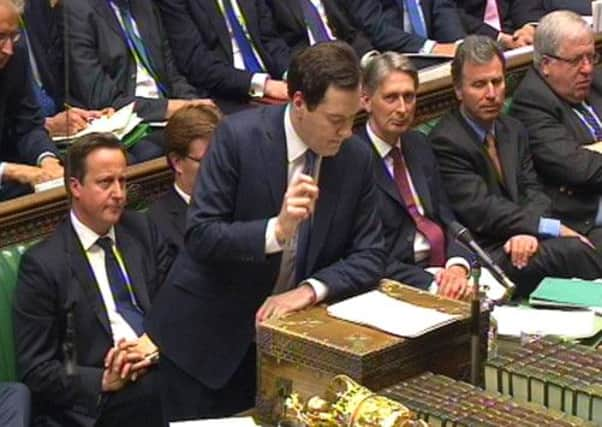Leaders: George Osborne | Edinburgh Trams


It was Mr Osborne the Machiavellian political operator who was to the fore in yesterday’s spending review. Anybody would think there was an election on the horizon. Or a referendum on Scottish independence.
Through his new position on a cap on welfare benefits, the Chancellor successfully handed Labour a dilemma as Ed Miliband seeks to position himself for the 2015 UK general election.
Advertisement
Hide AdAdvertisement
Hide AdAs things stand, Mr Miliband and his shadow chancellor Ed Balls – who has said he would include the old age pension in his version of a benefit cap – risk being seen as the enemy of the elderly. That is not a good place to be on the political landscape, especially given older people’s keenness on exercising their vote.
As for Scotland, last weekend the SNP’s John Swinney warned darkly of the Treasury’s increasing ability to use discretion when deciding what allocation of cash came to Scotland. It seems Mr Osborne has used that discretion to ensure Scotland is not hit as a hard as some people might have expected.
It is hard not to see this as a little bit of an incentive for Scottish voters, in the run-up to the 2014 independence referendum, to stay with the United Kingdom.
Not to be outdone on the political front, the Scottish Government was last night giving the strong impression that this settlement would allow Mr Swinney to honour pay commitments to key public sector workers. If this transpires, it will not prevent the SNP from condemning yesterday’s review – especially its welfare component – but that criticism might be less convincing that it might otherwise have been.
More broadly, Mr Osborne’s spending review does little to instil confidence that when the period under discussion comes to an end, Britain will be more confident about its economic future.
While Mr Osborne carries on with his political games, Britain is still stuck in the economic mire. The infrastructure spending in yesterday’s announcement is welcome, but the step change in strategy that would have answered the Chancellor’s critics and given a far more significant boost to growth was absent.
This is a Chancellor who, it seems, has too much politically invested in his austerity strategy to start changing course now. His party political games should not distract us from the inconvenient and unavoidable truth that this country is still in trouble, and the rescue Mr Osborne promised us when he took up residence in Number 11 Downing Street has so far eluded him, and us.
Yesterday’s announcement did not feel like a meaningful step towards a brighter economic future. And for that reason it must be regarded as another missed opportunity.
Wishful thinking is a poor business plan
Advertisement
Hide AdAdvertisement
Hide AdTHE electrical cables that will power the Edinburgh trams have been strung along Princes Street as the capital’s long-running public transport saga approaches the start of services in the summer of next year. But the controversy that has dogged this ill-starred project needs no power source to keep it moving.
The latest instalment, as we report today, is that the tram authorities are looking to boost the profitability of the line by seeking a tax break to avoid paying millions of pounds in corporation tax. This does not bode well. The business plan for the trams was initially on a far larger scale, with far greater usage by the Edinburgh population and, hence, far greater revenue.
As the route has shrunk to the current truncated single line between Edinburgh Airport and York Place, so has the projected usage and the anticipated amount of cash the trams will attract in ticket sales.
If it is indeed the case that the ultimate profitability of this project is dependent on the munificence of the taxman, then the council tax payers of Edinburgh had better brace themselves for an unpleasant surprise.
It may yet turn out that tram bosses have identified a surefire way of saving millions of pounds through “tax savings”. All available evidence, however, shows that HMRC, in seeking to alleviate the country’s desperate economic plight, is rarely in a mood to give any enterprise the benefit of the doubt, whether or not the business in question is regarded as a public good.
To base their business projections on such wishful thinking does not, to say the least, fill anyone with confidence.